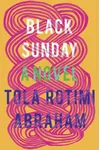Picture a Nigerian storyteller who weaves poetry, pain, and resilience into unforgettable tales—meet Tola Rotimi Abraham! Born in Lagos, this rising star of historical fiction captured hearts with her debut novel, Black Sunday, a soul-stirring saga of family and survival. Her lyrical blend of Yoruba, pidgin English, and street philosophy makes her a fresh voice in contemporary literature.
Abraham’s stories don’t just entertain; they cut deep, reflecting the gritty beauty of urban Nigeria. With a knack for crafting characters who feel like old friends, she’s quickly earning a spot on must-read lists. Let’s dive into her journey, from Lagos streets to literary stardom!
The Making of Tola Rotimi Abraham
Tola Rotimi Abraham grew up in the vibrant chaos of Lagos, Nigeria, where the pulse of the city shaped her storytelling. A graduate of the prestigious Iowa Writers’ Workshop, she honed her craft in the United States, blending her Nigerian roots with a global perspective. Before writing novels, Abraham taught at the University of Iowa and penned fiction and nonfiction for outlets like Catapult and The Nigerian Literary Magazine. Her early works, steeped in the rhythms of Lagos, laid the groundwork for her distinctive voice.
Influenced by postcolonial feminist writers like Toni Morrison and Buchi Emecheta, Abraham brings a sharp, empathetic lens to her narratives. Her move to Iowa City, where she pursued a graduate degree in journalism, added layers of nuance to her writing, letting her explore Nigeria from a distance with both clarity and longing.
Tola Rotimi Abraham’s Unforgettable Stories
Abraham’s debut, Black Sunday (2020), is a tour de force that follows four Nigerian siblings—twin sisters Bibike and Ariyike, and their brothers Andrew and Peter—over two decades in Lagos. When their parents’ marriage crumbles after a financial scam and job loss, the siblings are left with their Yoruba grandmother, navigating poverty, patriarchy, and personal dreams. Abraham’s prose, laced with poetry and Yoruba proverbs, captures the siblings’ distinct voices, making their struggles feel both intimate and universal.
Her writing style is a mesmerizing mix of lyricism and raw honesty. By weaving pidgin English, Yoruba, and street philosophy, Abraham creates a vivid sense of place—Lagos in the ’90s and 2000s comes alive with haggling merchants, charismatic pastors, and resilient dreamers. Themes of family, religion, and female resistance dominate her work, with the twin sisters’ divergent paths—one embracing modernity, the other religion—highlighting the complexities of survival in a patriarchal society.
While Black Sunday remains her flagship work, Abraham’s short stories and essays in publications like LitHub and Electric Literature showcase her versatility. Each piece carries her signature blend of cultural richness and emotional depth, cementing her as a storyteller to watch.
Why Tola Rotimi Abraham Matters
Tola Rotimi Abraham’s impact lies in her ability to tell stories that resonate across borders. Black Sunday, a 2020 Kirkus Prize finalist, has been praised for its unflinching look at urban poverty and gendered violence, earning nods from NPR and Sarah Jessica Parker. Her work amplifies Nigerian voices, particularly women’s, in global literature, joining the ranks of Chimamanda Ngozi Adichie and Teju Cole in redefining African storytelling.
By rooting her narratives in Lagos’ contradictions—wealth beside hardship, tradition clashing with modernity—Abraham offers a window into contemporary Nigeria. Her focus on resilience and agency inspires readers, proving that even in the face of loss, there’s beauty and hope to be found. As an Assistant Professor at the University of Missouri in St. Louis, she’s shaping the next generation of writers, ensuring her influence endures.
- Birthplace: Lagos, Nigeria
- Key Work: Black Sunday (2020)
- Education: Iowa Writers’ Workshop
- Award: 2020 Kirkus Prize finalist
Ready to get lost in a world of poetic prose and Nigerian grit? Snag Black Sunday and dive into Tola Rotimi Abraham’s unforgettable storytelling!
